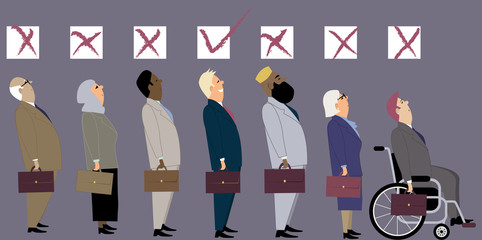“Bias is an intrinsic part of the human character but by harnessing technology in the right way we can start to counteract this” – this is the bold claim of Adrian Ezra, CEO of JamieAi, a UK-based HR-tech start-up.
His firm has a goal: to make hiring bias a thing of the past via AI.
By pairing technology insight with human expertise, JamieAi promises to deliver cost-effective, transparent and unbiased hiring for data professionals.
This is, of course, no mean feat; bias in hiring processes are rampant.
According to research JamieAi commissioned, where 500 job hunters were interviewed, 31% of respondents said they have experienced discrimination looking for work.
See also: Digital disruption means ethics is playing catch up – There’s a shared responsibility between tech giants to try and create and utilise a critical ethical framework that assigns responsibility and accountability.
When asked what factors were affecting their ability to get interviews or new job roles, 51% of respondents said they felt age played a part, while 25% said gender. A further 21% said social status made an impact, while 16% of people said that either their religion or sexuality had been an obstacle in finding employment.
As a result, 64% admitted to enhancing their job applications in the past. Just under half (49%) admitted to embellishing qualifications or experience, 27% excluded information, 14% even changed their name to sound more “English”, 18% have added their picture to boost the chances of securing a position and 13% have given the wrong age.
What about AI bias?
On the face of it, this AI solution sounds promising. But remember Amazon’s AI-operated recruitment system? Yeah, the one they scrapped.
Glenn Elliot, author of the 2018 bestseller, Build it: The Rebel Playbook for Employee Engagement, has previously spoken about the dangers of relying on AI to establish a diverse workforce.
He said: “AI systems work by analysing pools of past data, finding patterns and drawing conclusions, before then musing those patterns to make predictions about future data. This is all fine if these initial patterns of data are based upon a history of diverse candidate hires.
Related: The problems with using AI to establish a diverse workforce – Technology entrepreneur and author Glenn Elliott has revealed the challenges involved in recruitment, and why AI may not be the way forward
“Unfortunately, though, this simply isn’t the case. With past data sets heavily biased, especially around gender and race, AI is only serving to perpetuate this further by building a biased framework around the initial data it is given.”
Commenting on the Amazon case, he said: “The learning point here is that employing AI in the selection and management of people is going to be tough, and fraught with danger,”
“We’re going to have to work really hard from the outset to remove – and protect against – unwanted bias, which, to be honest, isn’t going to be easy.”
AI has hope
This, by no means, dismisses JamieAi’s potential. Essentially, for Ezra, AI has the possibility of refining focuses and removing the very processes that bring about bias.
“When recruiters currently ask candidates for demographic information, they inadvertently create space for discrimination to fuel existing biases,” said Ezra. “We are now seeing new models emerge that focus on skills, experience and preferences. Doing this not only reduces and prevents discrimination but also increases the overall accuracy of the service.
“At JamieAi we are working on best fit and match accuracy – making our technology as powerful as a top recruiter. I urge the industry leaders to add a tech first approach to their hiring process and focus on activating solutions that not only achieve greater efficiency and accuracy but begin to put an end to hiring bias altogether.”
See also: The recruitment conundrum: Assembling effective and diverse teams – Recruitment is one of the biggest challenges facing employers, who are looking to hire the most diverse and effective teams.







